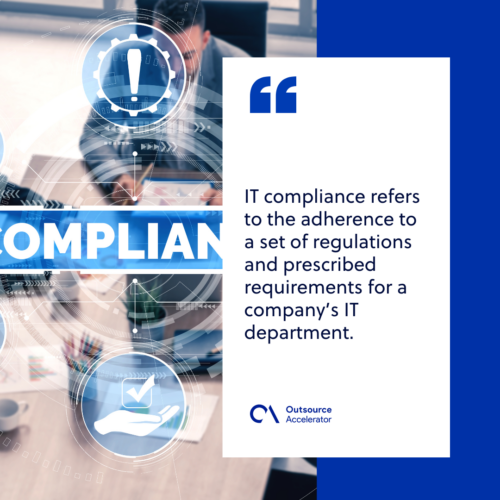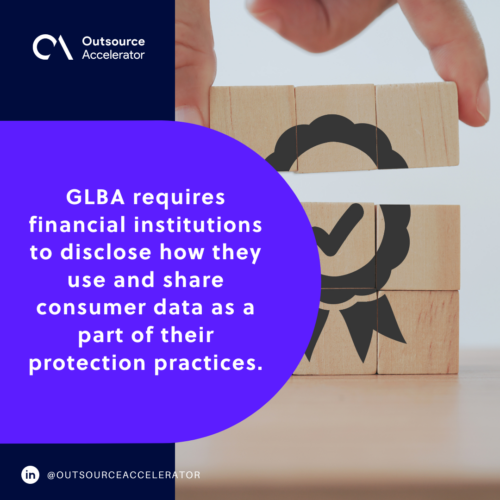5 common IT compliance standards you should know

Global IT compliance standards provide a critical line of defense for consumers engaging with businesses that handle and collect personal data. Likewise, these standards provide risk management measures that can prevent startups and small businesses losing millions.
Recently, JP Morgan was fined US$4 million for mistakenly deleting emails without proper procedure. When the act of deleting emails costs this much, it’s not difficult to imagine the financial–and reputational–costs of data breaches or compromised vulnerabilities.
While maintaining IT compliance can be time and resource-consuming, service providers like ConnectOS can help clients mitigate these risks through offshoring IT solutions.
This article explains the common IT compliance standards that every business should know.
What is IT compliance?
IT compliance refers to the adherence to a set of regulations and prescribed requirements for a company’s IT department. It encompasses a range of requirements covering data security, integrity, and protection against cyber risks.

IT security vs. IT compliance
The concepts of IT security and IT compliance overlap in terms of purpose and practices.
IT security protects the organization’s information and technology assets from unauthorized access, data breaches, and other malicious activities. This deals with protecting the organization, from its internal assets to its clients.
On the other hand, IT compliance addresses the legal and regulatory requirements organizations must meet to operate. This is built to protect clients, whether individuals or other entities, and their data.
Why maintain IT compliance?
Maintaining IT compliance is vital for the following reasons:
- Protection from breaches. IT compliance standards help safeguard and protect sensitive data from unauthorized access and potential breaches, preserving customer trust and loyalty.
- Protection from additional expenses. According to recent findings, non-compliance can cost twice as much as meeting compliance requirements. Following these standards can prevent additional expenses like penalties.
- Implementing best practices. Adhering to IT compliance standards ensures that organizations follow industry best practices and act as responsible data custodians.
5 common IT compliance standards to know
Numerous IT compliance standards may apply to your operations based on your industry and the geographic location you’re transacting with.
Here are the five common compliance standards that businesses should be familiar with:
1. GDPR
Firstly, the General Data Protection Regulation (GDPR) is an EU regulation that sets guidelines for collecting, storing, and processing personal data. It applies to all global organizations transacting within the European Union (EU), regardless of location.
GDPR compliance involves implementing strict data protection measures according to the level of risk involved in processing client data.
2. SOX
The Sarbanes-Oxley Act (SOX) is a US federal law that mandates financial transparency and auditing in public companies.
It aims to protect shareholders, staff, and the public from corporate fraud and accounting errors. The Act mainly focuses on the following areas:
- Establishing corporate responsibility
- Implementing accounting regulations
- Adding new protections
- Increasing criminal punishment for violators
3. FISMA
The Federal Information Security Management Act (FISMA) outlines security standards for government agencies and contractors. It is a companion to the E-Government Act of 2002, implementing federal data security regulations.
FISMA requires rigorous security controls and regular risk assessments to protect sensitive government information.
4. HIPAA
The Health Insurance Portability and Accountability Act (HIPAA) safeguards individuals’ health information. It applies to healthcare providers of all sizes, including small practices and their contractors.
HIPAA compliance involves implementing secure data storage, training employees on handling sensitive information, and letting patients control how their data is used.
5. GLBA
Last but not least, the Gramm-Leach-Bliley Act (GLBA) aims to protect consumer financial information. This is applicable to credit unions, insurance companies, and other organizations engaged in lending and financial activities.
GLBA requires financial institutions to disclose how they use and share consumer data as a part of their protection practices.

Following IT compliance standards: How offshore teams can help
Maintaining IT compliance can be a complex and resource-intensive task for many organizations.
That’s where offshore teams from service providers like ConnectOS are valuable.
ConnectOS provides Integrated Resourcing solutions from the Philippines that cater to each business’s unique needs and comply with all geographically-relevant compliance standards. Their deep expertise in IT security and compliance can help clients meet industry obligations and adhere to international security standards when hiring global teams.
Learn more about ConnectOS and their industry-leading IT security and compliance practices.







 Independent
Independent




